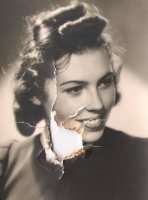
Aleksandra Cieciura (née Buchalczyk),
by her first marriage Waginska
born: 15.11.1924 in Kraszewo
Home Army corpswoman, aka "Ola"
a member of "Wkra" company
"Lukasinski" battalion of the Home Army
The Warsaw Uprising eyewitness accounts
War and insurgent memories
 |
|
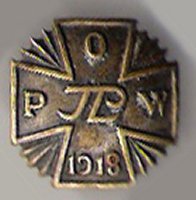
A Polish Military Organization badge
My father graduated from the noncommissioned officer academy and later became a student at the cadet school. However, the school was broken up due to the Germans' repressive measures in 1917. During his career at PMO he was promoted to the platoon commander level. In October of 1917 my father was transferred to Warsaw where he began studying forestry. He also participated in the process of disarming German soldiers in November of 1918.
After Poland regained its independence, my father served in the 1st Polish Light Horse Regiment from the 11th of November 1918 to the 21st of October 1920. He fought in its ranks in the battle for Vilnius, near Mejszagola, in the Operation Group under the command of Gen. Edward Rydz-Smialy. He later was awarded a Badge for the Liberation of Vilnius.
|
A badge for the liberation of Vilnius and the certificate
In 1920 father graduated from the Secondary School of Forestry, which was a part of the Central Agricultural Association in Warsaw. On the 1st of 1925 he was appointed to the rank of a second lieutenant of the reserves in the cavalry officer corps.
In view of my father's military past, I was raised in an atmosphere of cult of Marshal Pilsudski.
Together with my brother, Bogdan (who was 3 years older than me), we lived in a forester's lodge in Kraszewo for several years. When I was six years old, in 1930, my father was transferred to the Laznow forestry with the headquarters in Rokiciny (near Koluszki) in Lodz voivodeship. I attended a primary school there and studied along with the German children. That was because there were many German settlers in Laznowska Wola.
When in 1939 the war began, my father, who was the reserves commissioned officer, wanted to join the ranks of the nearest regiment. However, it wasn't easy. Three days after the war had begun, the German soldiers came by the lodge. They wanted to arrest my father. Fortunately, he wasn't home. Neither me nor my mother knew the reason for this sudden interest in him. It was only later that we were told that the Germans who lived nearby had arms which they used to poach and exterminate the game that my father was taking care of. And now the thieves came to take revenge. After a few days we received a message from the father's subordinate gamekeeper about his letter to us. In order to collect it I had to ride my bike in the early morning when it was still dark. I was only 15 years old. In the letter my father asked us to leave for Warsaw at once. He informed us that he couldn't come back to the lodge anymore. As we later learned - it was the right decision. Numerous of his fellow foresters were arrested and died in the German concentration camps.
With the help of the carter, my mother loaded everything we had on the cart and left for Warsaw. My father's family was waiting for us there. I took the train. And just like that we moved to the capital. Soon, my father joined us there too. We lived in Magdalenka (a dozen or so kilometers to the south-east of Warsaw). It was a gatehouse located on a large property belonging to the Ziolkowskis. Father was trying his best to earn money by carting away the rubble.
In Warsaw I attended Jan Kochanowski Municipal Girl's Secondary School and High School no. 2 which was a pre-war institution. During the occupation period, the headquarters on Rozbrat street was taken over by the german administration. In this case we were forced to continue our education in various parts of the city under the disguise of tailoring and painting courses. I, myself, attended the painting courses on Nowogrodzka street. The practical portion of the course was conducted in a place on Marszalkowska street.
In 1940, after I had finished a year of painting school and was cleared in a "snitcher verification", I started an actual education which was secretly conducted by the staff. The secret teaching took place in privat apartments. Zofia Domaniewska and Halina Domaniewska were two of the teachers working there. The former used to be a geography teacher before the war and the later was a history teacher and a wife of a well-known biology textbook author (and Zofia's brother).
Maria Rosciszewska was a headmistress of the school and served as a runner during the uprising. She died while dispatching a message. Despite the fact that some students had offered to do this task for her, she declined and died moments after.
Due to the fact that my parents were living outside of Warsaw, they were able to secure me a place in the Ursulines Sister dormitory on Leszno street. A charity organization called the Central Welfare Council paid for my stay there. The Sisters who ran the place were repatriated from Cracow. The dormitory was located just next to the ghetto. You could see through the window children sneaking through the narrow drain canals at the foot of the ghetto wall to get some food. Very often, on my way to school I used to see bodies of little Jewish children who were shot by the Germans. Many days would have had to pass until they cleared them off the streets. When they started closing down the ghetto in 1943, the dormitory was moved to the house of a countess in Mokotow. We returned to the original place only after they had completely shut the ghetto down in May of 1943.
During the time of the secret teaching I joined the underground scouting association called The Grey Ranks and adopted a pseudonym of "Ola". As it turned out, my teacher, Zofia Domaniewska, was a scoutmaster in The Gray Ranks. I also completed a corpsman course in that time.
I graduated in 1944 and had passed my matura exam just before the uprising broke out. After the war, Halina Domaniewska issued me with a certificate of matriculation, which later enabled me to study.
During one of the weekends at my parents' house in Magdalenka, I met Wlodzimierz Waginski, also known as Zdzich. His parents, Barbara and Jan, also had a summer house there.
We met quite often. We played volleyball, went for walks in the woods. Our casual but cordial acquaintance would later turn into a strong bond.
Zdzich was extremely engaged in the underground activity. He was a law student at the underground law department of Warsaw University and attended a Home Army cadet training. He was known under the pseudonym of "Konrad". He had very strong right-wing opinions and often disputed with me about Dmowski, trying to persuade me to string along with the National Democracy party. Although it was slightly conflicting with the views instilled in me, I was very impressed with his knowledge.
At some point it turned out that "Konrad" was compromised in Warsaw. Gestapo was breathing down his neck. Several of his friends were arrested. He was transferred to Krasnik, most likely to the guerilla unit at the school for infantry commanders. This was the place where many of the Warsaw and Cracow boys were sent. He went there under the false name of Lech Podosowski.
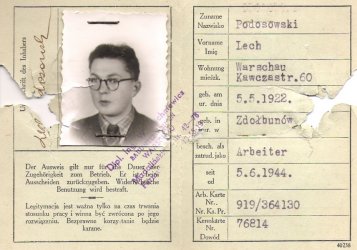
Zdzich's Ausweiss under the name of Lech Podosowski
After he had left we corresponded with each other. This lasted the whole year. In the meantime I graduated from high school. Zdzich's parents wanted him to come back to Warsaw and settle down. They were very pleased with the course of our relationship.
Around June of 1944, Zdzich returned from Warsaw. We got married in Warsaw cathedral on the 9th of July 1944. It was a traditional Latin mass wedding. One of the best Polish tenor singer, Leslaw Finze, performed during the mass. The marriage certificate was typical of the occupation and conspiratorial times. It had a false name written on it - Lech Podosowski. My age was decreased and my name was changed as well in fear of possible order to go to a German labour camp. I had a very bad feeling about our future throughout the whole ceremony. I cried my eyes out. Zdzich resented me for it.
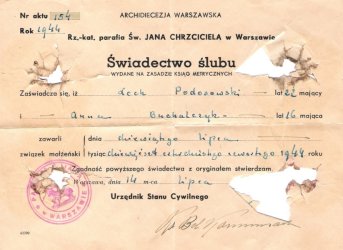
Our marriage certificate with false information
We took a buckboard to Magdalenka after the wedding. Everyone was silent. I felt a little better and my parents hosted a modest reception. There wasn't much room for us so we slept separately at our parents' houses. That was probably a bad omen as well.
Zdzich's parents paid the rent for our first apartment. It was located at 1 Kilinski Street in Old Town of Warsaw.
The 1st of August 1944 was approaching. People spoke about the uprising. You could feel the anxiety in the air. Young people wearing boots and coats in an attempt to provoke German patrolling soldiers. We spend a lot of time at my parents' house in Magdalenka. We felt so cramped there though. We would always go back home, relieved. I remember one day, when we took a cart back home, we were stopped by a patrolling soldier. I had a "Vis" pistol in a basket hidden underneath the vegetables. Fortunately, they didn't search us.
After the uprising had broken out we wanted to report back to our units. We both were assigned to the Praga district. The Germans had blocked the bridge though and we were forced to return to the Old Town. Zdzich had finished cadet training and held a cadet corporal rank. He reported to the neighbouring house. It was a seat for "Wkra" company, a part of the Home Army battalion called "Lukasinski". They welcomed him with open arms, especially because he brought his own weapons. He still used his nickname "Konrad". Zdzich was assigned to the company headquarters but he often had to work at the barricade on Dluga street. I joined his unit as a corpswoman.
The battles for the Old Town began. The Germans continuously kept the area under fire with artillery. The snipers attacked from the roofs. There was a great deal of guerilla casualties. The death was unavoidable.
On the 13th of August the insurrectionists obtained a tank on Kilinski street. What a joy that was. Everybody went down there to see it. So did I. The tank driver got out and said he was going to go get some coffee. I wasn't there much longer either. I walked off towards our place. Once I reached the gate of the building where our unit was stationed, the walls shook and the tank exploded. Lots of people died. It was a horrible sight. I remember it like it was yesterday. The tank was loaded with explosives. It made a huge crater in the ground. I barely got out with my life.
I was pregnant at this time. My eldest son, Marek, was born a few months after that incident. He was born with a tiny red spot on his head. He still has it. I believe that explosion marked him with it.
On the 20th of August, together with his comrades, Zdzich returned safe and sound from the barricade. As always, they received a warm welcome from the rest of the boys. At some point they were shot at by a German airplane while cleaning the arms. Zdzich was shot at the back. He sustained several wounds and would have been dead if not for his thick leather wallet that was in his back pocket. It weakened the force of the bullet and prevented it from hitting the pelvic bone. Because of it the wound wasn't deep. I managed to save that wallet and the documents that were inside to this day. You can still see the bullet marks on it.
We transported the injured boy to the hospital on Kilinski street, where the "Lukasinski" battalion was stationed. The nurses dressed my husband's wounds and moved him to the basement where the hospital was. Ever since that moment I was the only person to take care of him. I was there day and night. Although the wounds were festering I did hope for his quick recovery. He suffered immensely and wasn't able to stand up.
The battle for the Old Town was coming to an end. On the 1st of September all units, including Zdzich's, left the Old Town through the sewers. They left me and my wounded husband behind. There was a dying unconscious boy in the other basement room as well. Zdzich was in no condition to be moved through the sewers. Nevertheless, there was an insurrectional hospital (in the old Ministry of Justice building) not too far away at 7 Dluga Street.
On the 2nd of September I ran to that hospital and met with my scouting chaplain, a Jesuit priest, father Tomasz Rostworowski (aka "Tomasz", also a chaplain of the "Gustaw" and "Wigry" battalion and the main headquarters of the Home Army). He advised me to transport my husband to the hospital on Dluga street. He brought me the stretcher and had an Azerbaijani prisoner help me move Zdzich to the hospital under the flag of The Red Cross located on Dluga street. I was convinced that my husband will survive. We laid him down on the bed. Father Rostworowski was at his side.
The Germans were getting ready to enter the Old Town. It was announced that everybody was to vacate their homes and will be evacuated as the city will be mined. Zdzich was in no condition to stand up and go out to the streets. Even though it has been 60 years since this happened, I can't hold back my tears when I write this story. After only a short while, on the 2nd of September 1944, the Germans entered the hospital and ordered everyone to leave. I dressed my husband. During the uprising he usually wore a German uniform with a white and red band on a sleeve. He struggled to stand up. I tried to get him out. A German soldier pushed him and told him to stay back. He pointed the rifle at me and led me out. I begged him to let my husband come with me, but to no avail. They led me out and made me help with transporting a wounded woman on a stretcher.
They made us go to the Warsaw West train station. The weaker people who couldn't keep up were shot at. There were dead bodies everywhere. The city was engulfed in flames. They dragged us to the station and loaded us onto the electrical train which was about to take us to the temporary camp in Pruszkow. And from there, to a labour camp in Germany. I met a fellow corpswomen in the crowd. We bribed the train driver with rings to put us in a compartment next to the motor. Right after we passed the station, he applied the brakes and we jumped out. I ran in one direction and they went the other. They were shooting at us but I lied down in a ditch. This is how I survived.
I walked through the fields along the train tracks towards Piastowo. I came across a house. There were many injured people sitting on the steps. The stench from the wounds was unbearable. I spent a night there and left for Piastow again at dawn. I knew my brother, Bogdan, lived in Piastow. He used to work in a "Tudor" battery factory there. I managed to find the house he lived in although I only knew the last name of the hosts. During this time my brother was at my parents' house in Magdalenka as the factory was shot down. Luckily, one day, he happened to come to Piastow on his bike and we could meet. We were so happy to see each other and couldn't stop crying. He took me on his bike back to Magdalenka where I could see my parents.
As I have learned later, all the wounded people at Dluga street hospital were murdered and burned. There was, however, a rumor that those who were in the basement, survived. My mother, my grandmother Basia (my husband's mother) and I were looking for Zdzich in the local hospitals. We were telling ourselves that maybe he survived. Maybe the Germans allowed him to evacuate too.
Some of the wounded men from the Old Town that we met in Brywinow, told us that they were in the basement of the hospital as well. They survived and were moved to the current hospital only after they had convinced the Germans that they were soldiers and not rebels. They said they heard how the Germans were shooting the wounded and burned the hospital down. I still get very emotional thinking about those events.
I never found my husband's body. All I have left of him is the wallet with the bullet marks, some documents and a few other personal "talismans" including some photos of me that were inside. The documents and my photo that you see above were inside of that wallet too. You can see the bullet marks in them.
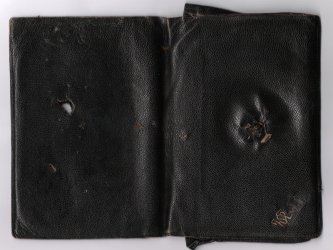
The wallet with the bullet marks in it
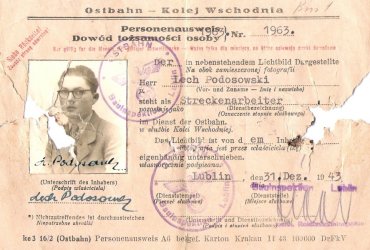
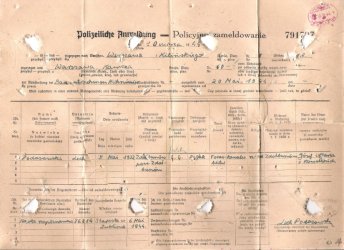
An identification card and a registration of residence of Wlodzimierz Waginski
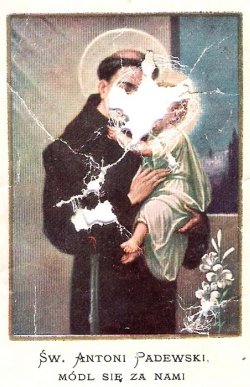
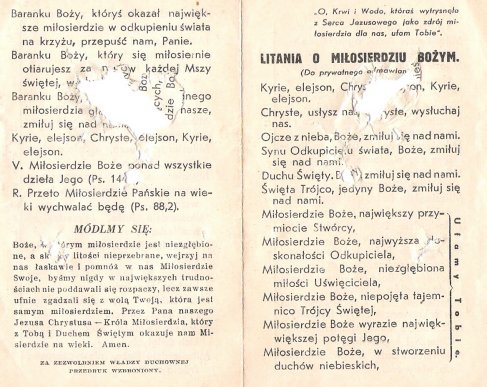
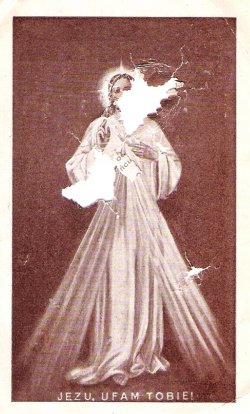
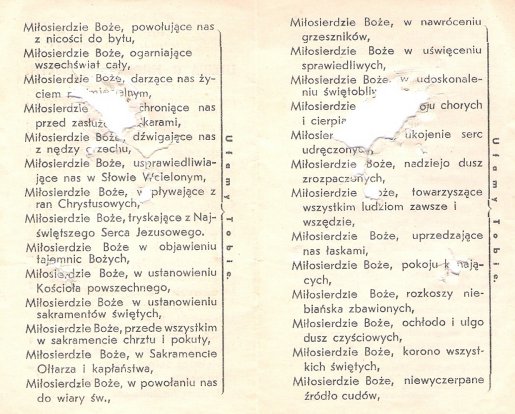
Holy pictures and a passage from a prayer
A symbolic grave made for Zdzich is located in Old Powazki Cemetery in Warsaw.
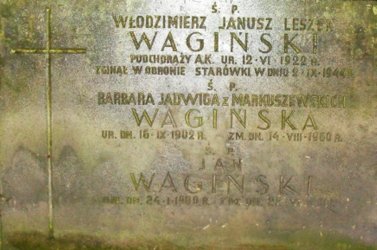
A symbolic grave located in Old Powazki Cemetery that he shares with his parents.
My father (aka "Suchy"), during the occupation times, was a commanding officer of the 1727 platoon, the 4th company, the 2nd battalion and the 7th district of the Warsaw precinct called "Obroza". During the Warsaw Uprising, the company he commanded went by the name of "Polesie" and "Sekocin Las" and it belonged to the "Helenow" regiment. My father was awarded a Vilnius Badge (1919), the War Medal (1918-1921), a Bronze Medal for the Longtime Service, a Medal of Independence (1935) and a Silver Cross of Merit with Swords (awarded in 1949 in London) to name just a few.
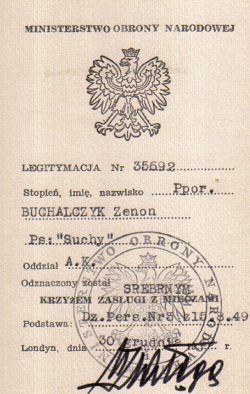
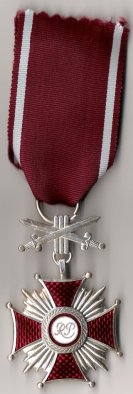
The Cross of Merit with Swords and the certificate
My mother was responsible for the supplies during the war. She was a member of the woman section in the Home Army organization stationed in the area that's currently a Lesznowola parish. She was awarded a Grunwald Badge (1970), the Medal of Victory and Freedom (1972) and the Knight's Cross of The Order of Polonia Restituta (1975).
After the war had finished me and my parents returned to Rokiciny forestry. Both me and my brother wanted to take up the studies in Lodz. However, the commuting to the school would have been very complicated. So my father moved to Galkowek en route to Lodz/Koluszki. It was there that my son, Marek, was born in May 1945. Soon my father got a job at the National Forest Board in Lodz. This is how we ended up in my parents' hometown.
My brother, Bogdan, returned to Magdalenka. He met his wife there. Her name was Barbara Markuszewska. After he had graduated from the H. Wawelberg and S. Rotwand School of Engineering in Warsaw, he continued to work in engineering all his life. He has 2 sons: Jacek and Tomek.
His brother-in-law, Janusz Markuszewski (aka "Boleslaw Kucharski"), was a Home Army soldier. He died on the 17th of October 1943 while he was dismantling the Germans on Powazkowa street. Wladyslaw Podlewski (aka "Pogoria"), the husband of Hanna Waginska (who was my husband's sister) also died during the Warsaw Uprising. He was a Home Army soldier and belonged to "Belt" battalion. He sustained a serious wound in his stomach. He was killed on Poznanska street. His name is mentioned on the Memorial Wall in Warsaw Uprising Museum (row no. 196, 42nd from the top). He also had a son, Stanislaw Podlewski.
After the war I received from father Rostworowski a death certificate stating that my husband died in the uprising. I remarried in 1949. My second husband's name is Leszek Cieciura. We have 2 children: Piotr and Marcelina.
I graduated in 1950 from Medical Academy of Lodz with a stomatology degree. I passed my exams of second degree specialization in preservative stomatology and spent my whole career working at the Military Medical Academy of Lodz. In the 80's I took up painting. My work has been exhibited both on its own and collectively with other artists. I received numerous awards and my work has been recognized on various occasions. My family values that I received as a child had influenced my paintings. One of them represents Marshal Pilsudski. I was inspired by Zdzislaw Czermanski when I created it. It is much bigger and more colorful than the original though.
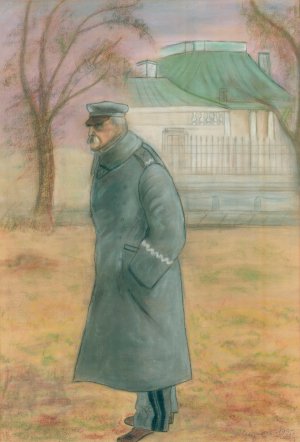
The painting of Marshal Jozef Pilsudski
Father Rostworowski died on the 9th of March 1974. He was buried in the cemetery in Doly in Lodz. My parents and several other members of my family are buried there as well. I always visit his grave when I'm there.
My husband's name is mentioned on the Memorial Wall in the Warsaw Uprising Museum (row no. 142, 59th from the top).
In 1995 Wlodzimierz Waginski was posthumously awarded the Warsaw Uprising Cross, the Partisan Cross, the Home Army Cross and the Medal For the liberation of Warsaw 1939-1945 by the President of Poland.
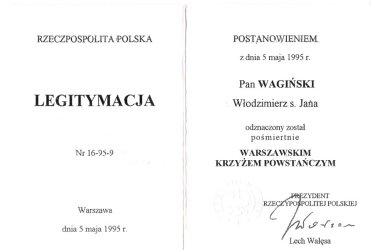
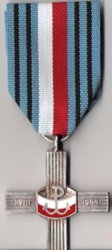
The Warsaw Uprising Cross and the certificate±
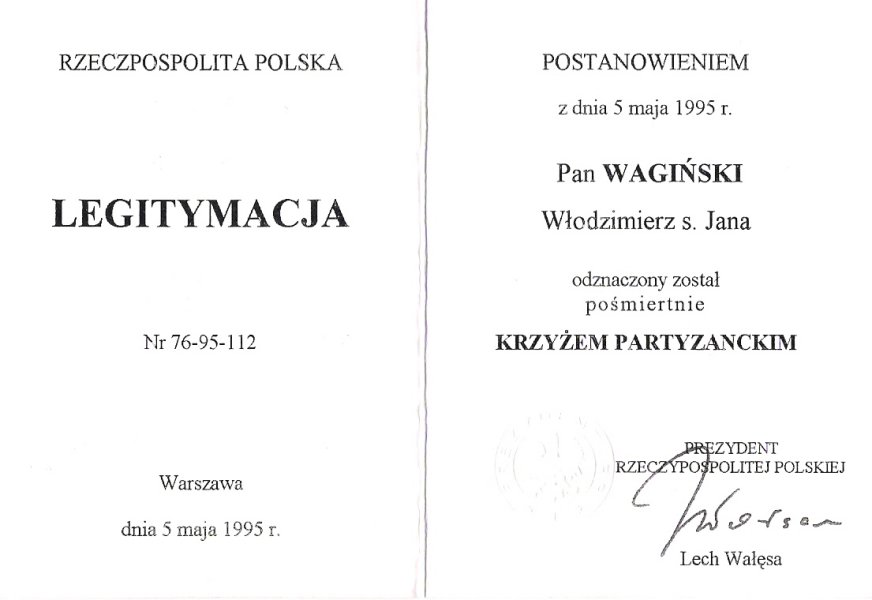
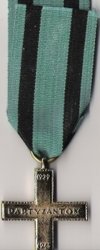
The Partisan Cross and the certificate
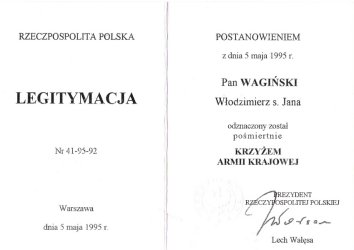

The Home Army Cross and the certificate
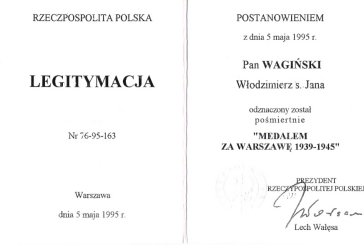

A Medal for the Liberation of Warsaw
Awarding all these honours to Cpl Cadet Wlodzimierz Waginski and a memory of his name on the Memorial Wall I credit to our only son, Marek Cieciura.
Aleksandra Cieciura
editing: Marek Cieciura and Maciej Janaszek-Seydlitz
translation: Emilia Wi¶niewska
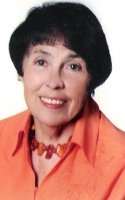
|
Aleksandra Cieciura (née Buchalczyk) by her first marriage Waginska born: 15.11.1924 in Kraszewo Home Army corpswoman, aka "Ola" a member of "Wkra" company "Lukasinski" battalion of the Home Army |
Copyright © 2020 Maciej Janaszek-Seydlitz. All rights reserved.